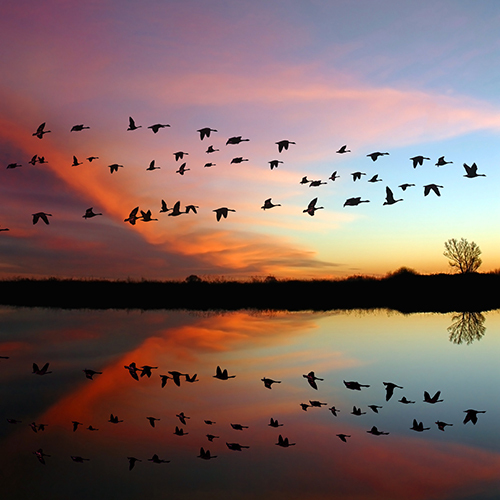
In the last few weeks, the U.S. Fish and Wildlife Service (Service) has published several major regulatory actions affecting federal avian protections. The Service has repealed a Trump-era rule that excluded incidental take from liability under the Migratory Bird Treaty Act (MBTA), issued guidance for enforcement of the MBTA against incidental take, and invited comment on a potential MBTA permitting program. Separately, the Service has invited comment on ways to improve its existing permitting program for the incidental take of eagles (Eagle Permit Program).
On October 4, 2021, the Service published several actions addressing incidental take under the MBTA. The actions included the anticipated final revocation of a Trump Administration rule that defined the MBTA’s prohibition on taking migratory birds to exclude incidental take. The October 4, 2021 final revocation rule takes effect in 60 days, meaning that the Trump Administration rule will be revoked effective December 3, 2021. In the preamble, the Service stated its intention to return to its prior position that incidental take is prohibited by the MBTA and that it will apply its enforcement discretion when administering the MBTA.
To provide clarity on how the Service will exercise its enforcement discretion, the Service also published a Director’s Order, effective December 3, 2021, which provides instruction to Service personnel on the types of conduct that will be prioritized for enforcement. The Director’s Order instructs the Service to focus enforcement efforts on activities that foreseeably cause incidental take where the “proponent fails to implement known beneficial practices to avoid or minimize take.” The Director’s Order includes a link to a Service webpage that lists beneficial practices, broken down by industry.
The Service also published an Advanced Notice of Proposed Rulemaking (ANPR) and notice of intent to prepare an Environmental Impact Statement with a public comment period that closes December 3, 2021. The ANPR solicits input on how the Service could provide a permit pathway under the MBTA for incidental take. The Service proposes a three-tier system: (1) exceptions to the MBTA's prohibition on incidental take; (2) general permits for certain activity types; and (3) specific or individual permits. The ANPR also solicits information specific to certain industries and how those industries impact migratory birds, what beneficial practices are available, and what the costs may be to implement those beneficial practices on both existing and new infrastructure. The industries specifically named include:
(a) Communication towers;
(b) Electric transmission and distribution infrastructure;
(c) Onshore wind power generation facilities;
(d) Offshore wind power generation facilities;
(e) Solar power generation facilities;
(f) Methane and other gas burner pipes;
(g) Oil, gas, and wastewater disposal pits;
(h) Marine fishery bycatch;
(i) Transportation infrastructure construction and maintenance; and
(j) Government agency activities (excluding military-readiness activities already covered under 50 CFR § 21.15).
In addition to the public comment period, the Service will host a number of public scoping meetings in late October and throughout November. Dates and information can be found here.
On September 14, 2021, the Service published an ANPR soliciting input on its existing Eagle Permit Program. The Service developed the Eagle Permit Program to provide a permit pathway for the non-purposeful take of golden and bald eagle species, which is prohibited by the Bald and Golden Eagle Protection Act (BGEPA). The Service initially introduced the Eagle Permit Program in 2009, and amended the regulations in 2016 (codified at 50 CFR § 22.26). This latest ANPR arises as part of a court settlement from a lawsuit brought by the Energy and Wildlife Action Coalition challenging the Eagle Permit Program. In the ANPR, the Service solicits input on ways to increase processing efficiency and reduce the cost of the Eagle Permit Program. In particular, the ANPR seeks input on streamlined permit approaches that may be used to process wind energy Eagle Permits. The eagle ANPR public comment period closes October 29, 2021.
- Partner
Brooke Marcus is a natural resources lawyer focused on assisting the renewable energy sector with maintaining compliance with environmental laws. She is go-to counsel for matters involving the Endangered Species Act (ESA), the ...
- Partner
Svend Brandt-Erichsen focuses his practice on the development and ongoing operation of energy and natural resource projects. He advises companies on permitting, compliance, regulatory development and other issues arising ...
Nossaman’s Endangered Species Law & Policy blog focuses on news, events, and policies affecting endangered species issues in California and throughout the United States. Topics include listing and critical habitat decisions, conservation and recovery planning, inter-agency consultation, and related developments in law, policy, and science. We also inform readers about regulatory and legislative developments, as well as key court decisions.
Stay Connected
 RSS Feed
RSS Feed
Categories
- Alternative Energy
- Bald and Golden Eagle Protection Act
- Budget
- CEQA
- CESA
- Climate Change
- Congress
- Conservation
- Construction Projects
- Consultation
- Continuing Education
- Court Decisions
- Critical Habitat
- Delisting
- Endangered Species Act
- Event
- Fish & Wildlife Service
- Freedom of Information Act
- Government Administration
- Legal
- Legislation
- Listing
- Litigation
- Migratory Bird
- National Marine Fisheries Service
- NEPA
- Off Shore Wind
- Pacific Northwest
- project
- Publications
- Regulatory Reform
- Sacramento-San Joaquin Delta
- SEPA
- Speaking Engagements
- Supreme Court
- Texas
- Timberland
- Water Issues


